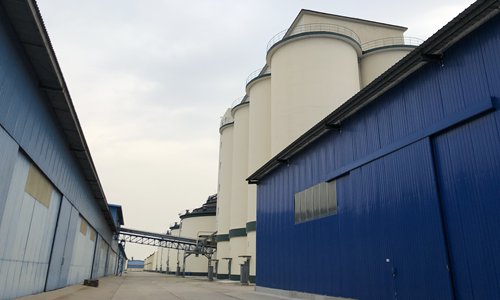HOME >> BUSINESS
Sinograin aims to guarantee China’s ‘rice bowl’
Source:Global Times Published: 2019/9/11 23:44:42

A view of the grain warehouse of Sinograin's Zhuozhou site in North China's Hebei Province on Wednesday. Photo: Zhang Hongpei/GT
China's state stockpiler Sinograin vowed on Wednesday that it will continue to guarantee a safe grain supply for Chinese people and will upgrade its facilities toward intelligence and high technologies.
During the launch event for its second public open day on Wednesday, Xu Gaofeng, deputy general manager of Sinograin, said the national grain stockpiler will open more than 400 of its directly affiliated grain warehouses to the public in the next three years.
Currently, the total warehouse capacity of Sinograin is nearly 100 million tons in its over 900 warehouses across China, 6.8 times the amount when the company was founded in 2000.
The firm has also built the world's largest internet of Things (IoT) system for grain storage, using 4.32 million sensors and 81,158 cameras across the country.
It can monitor the grain inventory through high technologies such as big data analysis to predict the temperature trend and realize autonomous ventilation when it is needed for the harvest.
"China's grain storage facility is currently the world's best in terms of management and technology," said Wang Wenbo, head of Sinograin's warehouse in Zhuozhou, North China's Hebei Province, during a public visit on Wednesday.
Currently, about 98 percent of grain reserves in Sinograin has realized digital management.
The main imports for the company in terms of volume are soybeans, which accounted for 16.74 million tons out of the total imports of 50.18 million tons of grain, cotton and oil from 2004 to 2017.
Data released by the General Administration of Customs on Sunday showed that China bought 56.32 million tons of soybeans in the first eight months of the year, down 9.2 percent on a yearly basis.
China slapped 25 percent tariffs on certain US products including soybeans in July last year, in response to the US tariff hikes, and the move has taken a toll on US farmers.
Since the trade war, however, soybean imports have been plunging. In 2018, China's total amount of imported soybeans dropped 7.9 percent to 88 million tons. The amount from the US plummeted 49.4 percent to 16.6 million tons.
Besides boosting soybean production in northeastern China to increase self supply, the country is also diversifying its import sources.
On Wednesday, China announced that imports of soymeal from Argentina would be allowed for the first time.
Global Times
RELATED ARTICLES:
Posted in: ECONOMY,BIZ FOCUS